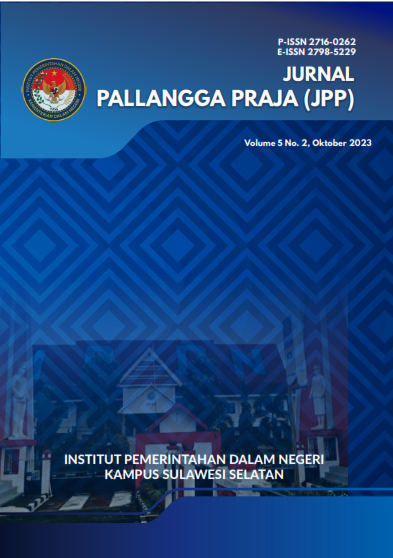Building Resilience Public Organizations Through Technological Innovation In Public Services In Indonesia
Kata Kunci:
Organization Resilience, Technology, Public servicesAbstrak
In today's digital era, technological innovation has become a key pillar in enhancing the effectiveness and resilience of public organizations. This study aims to analyze how technological innovation contributes to building resilient public organizations in Indonesia, particularly in the realm of public service delivery. A descriptive qualitative approach was employed, utilizing in-depth interviews and document analysis in government institutions implementing the Electronic-Based Government System (SPBE). The findings reveal that technological innovation improves service efficiency, accelerates administrative processes, and strengthens organizational capacity in responding to change and crisis. However, infrastructure disparities, low digital literacy, and resistance to change remain significant challenges that must be addressed to achieve sustainable organizational resilience.
Unduhan
Referensi
Anckar, R. (2016). Digital entrepreneurship in Finland – a Narrative oF a Finnish digital entrepreneur. Innovative (Eco-) Technology Entrepreneurship and Regional Development. Conference Proceedings.
Arayankalam, J., Khan, A., & Krishnan, S. (2020). How to deal with corruption? Examining the roles of e-government maturity, government administrative effectiveness, and virtual social networks diffusion. International Journal of Information Management, 102203. https://doi.org/https://doi.org/10.1016/j.ijinfomgt.2020.102203
Ashaye, O. R., & Irani, Z. (2019). The role of stakeholders in the effective use of e-government resources in public services. International Journal of Information Management, 49, 253–270. https://doi.org/https://doi.org/10.1016/j.ijinfomgt.2019.05.016
Awotwi, J., & Amega-Selorm, C. (2015). A case study of an African e-Government/e-Governance development. ACM International Conference Proceeding Series, 2015-Novem, 49–58. https://doi.org/10.1145/2846012.2846040
Bel, G., & Esteve, M. (2022). Resilient managed competition during pandemics: Lessons from the Italian experience. Health Economics, Policy and Law, 17(2), 220–223. https://doi.org/10.1017/S1744133120000365
Chong, M. C., Francis, K., Cooper, S., Abdullah, K. L., Hmwe, N. T. T., & Sohod, S. (2016). Access to, interest in and attitude toward e-learning for continuous education among Malaysian nurses. Nurse Education Today, 36, 370–374. https://doi.org/https://doi.org/10.1016/j.nedt.2015.09.011
Crusoe, J., Magnusson, J., & Eklund, J. (2024). Digital transformation decoupling: The impact of willful ignorance on public sector digital transformation. Government Information Quarterly, 41(3), 101958. https://doi.org/https://doi.org/10.1016/j.giq.2024.101958
Farid, M., Baharuddin, A., & Said, M. I. (2023). Analysis of the Government’s Role in Promoting Innovation Readiness in Micro, Small, and Medium-sized Industries in Indonesia. Jurnal Ilmiah Ilmu Administrasi Publik, 13(2), 631–640. https://doi.org/10.26858/jiap.v13i2.53041
Korneeva, E. (2023). Leading Information and Communication Model for Social and Economic Sustainability of the Post-Pandemic Small and Medium Business. In S. W. (Ed.), Springer Proceedings in Business and Economics (pp. 161–172). Springer Nature. https://doi.org/10.1007/978-3-031-28131-0_12
Maulana, R. Y., Bafadhal, F., & Firmansyah, A. (2019). E-Government Implementation: The Concept of Innovative Transformation of Leadership and Public Officials’ Capacities in Indonesian Open Government (The Case of Evaluating E-Government Utilization in Government Information Management in Jambi Province). Available at SSRN 3497307.
Nugroho, T. W. A. (2017). Analisis E-Government Terhadap Pelayanan Publik Di Kementerian Hukum Dan Ham (Analysis Of E-Government To Public Services In The Ministry Of Law And Human Rights). Jurnal Ilmiah Kebijakan Hukum, 10(3), 279–296.
Profiroiu, C. M., Negoiță, C. I., & Costea, A. V. (2024). Digitalization of public administration in EU member states in times of crisis: the contributions of the national recovery and resilience plans. International Review of Administrative Sciences, 90(2), 336–352. https://doi.org/10.1177/00208523231177554
Ragazou, K., Passas, I., & Sklavos, G. (2022). Investigating the Strategic Role of Digital Transformation Path of SMEs in the Era of COVID-19: A Bibliometric Analysis Using R. Sustainability (Switzerland), 14(18). https://doi.org/10.3390/su141811295
Salam, R., Bahasruddin, A., Wijaya, I. D., & Faisal, M. (2024). Strategies For Enhancing Resilience In Government Governance In The Digital Era. Jurnal Administrasi Publik, XX(2), 309–326.
Suprapto, S., Lalla, N. N., Mulat, T. C., & Arda, D. (2023). Human resource development and job satisfaction among nurses. International Journal of Public Health Science, 12(3), 1056–1063. https://doi.org/10.11591/ijphs.v12i3.22982
Trieu, H. D. X., Nguyen, P. V, Tran, K. T., Vrontis, D., & Ahmed, Z. (2023). Organisational resilience, ambidexterity and performance: the roles of information technology competencies, digital transformation policies and paradoxical leadership. International Journal of Organizational Analysis. https://doi.org/10.1108/IJOA-05-2023-3750
Tukamuhabwa, B., Mutebi, H., & Isabirye, D. (2023). Supplier performance in the public healthcare: internal social capital, logistics capabilities and supply chain risk management capabilities as antecedents in a developing economy. Journal of Business and Socio-Economic Development, 3(1), 50–68. https://doi.org/10.1108/jbsed-04-2021-0046
Van Kranenburg, R., Bohara, R., Yahalom, R., & Ross, M. (2023). Cyber Resilience, Societal Situational Awareness for SME. Proceedings of the 2023 IEEE International Conference on Cyber Security and Resilience, CSR 2023, 458–463. https://doi.org/10.1109/CSR57506.2023.10225011
Virtanen, P., Laitinen, I., & Stenvall, J. (2018). Street-level bureaucrats as strategy shapers in social and health service delivery: Empirical evidence from six countries. International Social Work, 61(5), 724–737. https://doi.org/10.1177/0020872816660602
Viterouli, M., Belias, D., Koustelios, A., & Tsigilis, N. (2024). Optimizing Adaptive Performance: Exploring Organizational Learning Culture across Generations. Journal of Chinese Human Resources Management, 15(4), 3–27. https://doi.org/10.47297/wspchrmWSP2040-800501.20241504
Yan, K., Balijepalli, C., & Druyts, E. (2021). The Impact of Digital Therapeutics on Current Health Technology Assessment Frameworks. Frontiers in Digital Health, 3, 667016. https://doi.org/10.3389/fdgth.2021.667016



